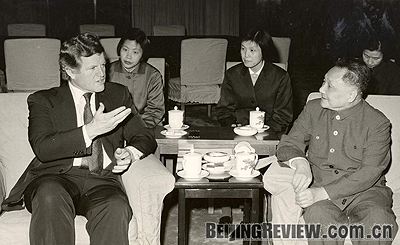|

SENSITIVE DIALOGUE: Shi Yanhua (back center) interprets for late Chinese leader Deng Xiaoping and U.S. Senator Edward Kennedy (left) in January 1978 during the senator’s visit to China
Concluding her four-year tenure as China's ambassador to Luxembourg in 1998, veteran diplomat Shi Yanhua pleasantly accepted a demotion to become a minister counselor in China's embassy to France. Her other identity at the embassy was wife of ambassador Wu Jianmin, who needed a hostess for his frequent diplomatic banquets.
In 1994, Shi and Wu became the first couple heading two of China's diplomatic missions at the same time: one in the Netherlands and one in Luxembourg.
During her nearly 40-year diplomatic career, Shi spent most of her time working as a translator or interpreter. After she retired as a diplomat, the Ministry of Foreign Affairs rehired her for her excellent translation skills. At the age of 69, Shi still works three days a week as an English polisher of documents at the Department of Translation and Interpretation, which she once headed. She is also a vice president of the Translators Association of China.
Graduating from a postgraduate course at the English Department of Beijing Foreign Studies University in 1965, Shi, who had planned to become an English teacher, was admitted by the Ministry of Foreign Affairs. Between 1971 and 1975, she was stationed at the UN headquarters to interpret and translate for China's permanent representative and deputy permanent representative. Her career peaked between 1975 and 1985 when, as one of the top English interpreters in China, she interpreted frequently for top state leaders. She also participated in the negotiations leading to the establishment of Sino-U.S. diplomatic relations in 1979.
She said compared with interpreters of other sectors, diplomatic interpreters must have a good knowledge of politics and a higher level of accuracy since their interpretations can directly reflect a government's stance.
Shi also did a lot of translation work, which she believes laid a solid foundation for her interpretation. She said since translation requires a higher degree of accuracy than interpretation, her rich work experience in translation empowered her to interpret even incomplete sentences in casually spoken Chinese into a logical flow of ideas.
| 